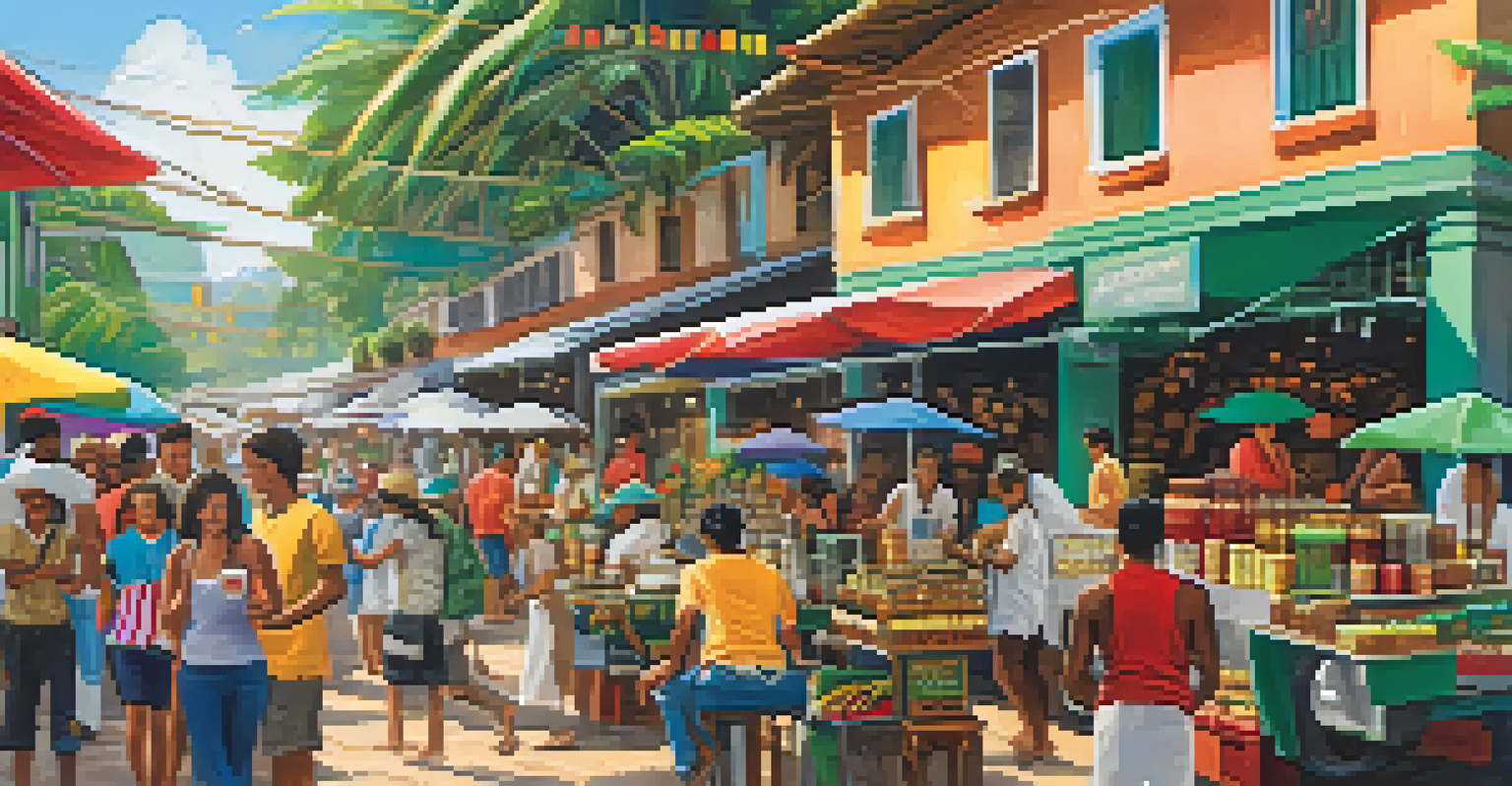Cultural Significance of Coffee in Brazil's History

The Origins of Coffee Cultivation in Brazil
Coffee was introduced to Brazil in the 18th century, and it quickly became a staple crop. The first seeds were brought from French Guiana, and they thrived in Brazil's diverse climate. This fertile land offered ideal conditions for coffee cultivation, leading to rapid growth in production and export.
Coffee is a language in itself.
As coffee farms spread across the country, the Brazilian economy began to shift. By the 19th century, Brazil emerged as a leading coffee producer globally, with vast plantations dominating the landscape. This boom not only transformed agriculture but also attracted waves of immigrants seeking work.
The rise of coffee cultivation laid the groundwork for Brazil's cultural identity. Coffee became more than just a beverage; it represented prosperity and national pride, influencing various aspects of Brazilian life, from social gatherings to political movements.
Coffee's Role in Brazilian Society and Economy
Throughout Brazil's history, coffee has played a crucial role in shaping its economy. The coffee industry became the backbone of Brazil's export market, contributing significantly to the country's wealth. This economic power also gave rise to the 'café com leite' political alliance, which influenced national policies.

As coffee exports boomed, cities like São Paulo and Rio de Janeiro flourished, attracting people from all walks of life. This influx of diverse populations helped shape Brazil's vibrant culture, with coffeehouses emerging as social hubs for intellectual discussions and artistic expression.
Coffee's Economic Impact in Brazil
Coffee has transformed Brazil's economy, becoming a crucial export and shaping the nation's wealth and cultural identity.
Today, coffee remains a vital part of Brazilian identity. It's not just about the drink; it's about the experience of sharing a cup with friends and family, reflecting the warmth and hospitality that Brazil is known for.
The Cultural Rituals Surrounding Coffee in Brazil
In Brazil, coffee drinking is a cherished ritual that transcends mere consumption. The act of brewing and serving coffee often involves family and friends, creating a sense of community. This tradition is emblematic of Brazil's warm and welcoming culture.
Life is too short for bad coffee.
The preparation of coffee can vary widely across regions, with each area adding its unique twist. For instance, in the north, 'café com açúcar' (coffee with sugar) is prevalent, while in the south, stronger brews are favored. These variations reflect the regional diversity within the country.
Moreover, coffee is often accompanied by sweet treats, further enhancing the social experience. These rituals have not only solidified coffee's place in everyday life but also established it as a symbol of hospitality and connection.
Coffee and Brazilian Music: A Harmonious Connection
Coffee has deeply influenced Brazilian music, becoming a recurring theme in various genres. From samba to bossa nova, songs often celebrate the joy and warmth associated with coffee culture. This connection underscores how integral coffee is to the Brazilian way of life.
Artists frequently draw on coffee imagery to evoke feelings of nostalgia and home. For many Brazilians, the mention of coffee in songs stirs memories of family gatherings and shared moments, highlighting its emotional significance.
Cultural Rituals Around Coffee
In Brazil, coffee drinking is a cherished ritual that fosters community and reflects the country's warm hospitality.
Additionally, music events often feature coffee as a staple beverage, further intertwining the two cultural elements. Whether at a local bar or a grand festival, coffee and music create an atmosphere of joy and camaraderie.
The Impact of Coffee on Brazilian Literature
Brazilian literature has often reflected the country's relationship with coffee. Many authors have woven the themes of coffee cultivation and consumption into their works, exploring its socio-economic implications. This literary connection showcases coffee as a metaphor for broader cultural narratives.
Writers like Jorge Amado have depicted the coffee plantations' impact on society, illustrating the lives of workers and their struggles. Through these stories, readers gain insight into the complexities surrounding Brazil's coffee industry and its historical context.
Furthermore, coffee serves as a backdrop for personal stories, symbolizing comfort and connection. In literature, it often represents moments of reflection and community, reinforcing its importance in Brazilian culture.
Global Influence: Brazil's Coffee on the World Stage
Brazil's dominance in the coffee market has shaped global coffee culture significantly. As the largest producer of coffee beans, Brazilian coffee has become synonymous with quality and flavor worldwide. This global reach has helped to elevate Brazil's status in the international economy.
The influence of Brazilian coffee extends beyond just exports; it has introduced unique brewing methods and coffee varieties to the world. Brazilian coffee's rich, bold flavors have inspired countless coffee enthusiasts and baristas across the globe to experiment with different preparation techniques.
Brazil's Global Coffee Influence
As the largest coffee producer, Brazil significantly shapes global coffee culture, introducing unique brewing methods and flavors.
Moreover, Brazil's coffee culture has fostered international collaborations, from coffee festivals to barista competitions. This exchange of ideas and practices has enriched the global coffee community, making Brazil a central player in the coffee narrative.
Contemporary Trends in Brazil's Coffee Culture
In recent years, Brazil has witnessed a resurgence of interest in specialty coffee. With an increasing number of artisanal roasters and coffee shops, the focus has shifted towards high-quality, sustainably sourced beans. This trend reflects a growing appreciation for the craft of coffee-making.
Many Brazilian coffee producers are now adopting innovative practices, emphasizing sustainability and environmental responsibility. This movement not only benefits the planet but also enhances the reputation of Brazilian coffee on the global stage, appealing to eco-conscious consumers.

Furthermore, the rise of coffee tourism has allowed visitors to experience Brazil's rich coffee heritage firsthand. Tourists can explore plantations, learn about the brewing process, and savor the diverse flavors that Brazilian coffee offers, deepening their connection to the culture.